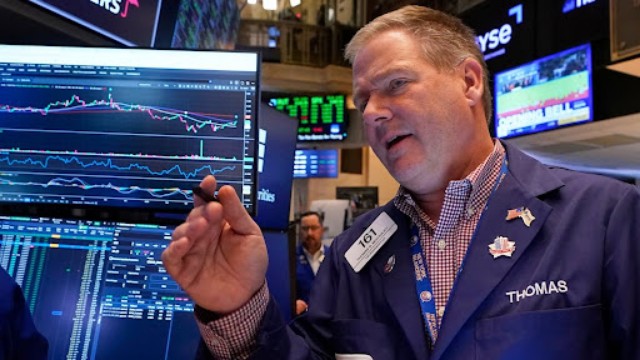
Thomas McCauley, a trader, is seen at work on the floor of the New York Stock Exchange on Friday, May 9, 2025. (AP Photo/Richard Drew)
Wall Street cheered on Monday after a major breakthrough in trade talks between the United States and China brought relief to global markets. Both countries agreed to pause their ongoing tariff war for 90 days, offering a temporary but much-needed breather for investors, businesses, and consumers.
The agreement means both nations will scale back many of the tariffs they had imposed on each other’s goods, a move welcomed by economists who feared that continued trade tensions could push the U.S. into a recession and lead to higher prices for everyday products.
Investors responded with enthusiasm. The Dow Jones Industrial Average surged by 1,160 points, closing at 42,410.10 — a jump of 2.8%. The S&P 500 also saw a sharp rise of 3.3%, while the tech-heavy Nasdaq soared by 4.3%, lifted by optimism in the tech and retail sectors.
This sharp uptick marks a dramatic rebound for the S&P 500, which had recently been nearly 20% below its all-time high. The rally brings it back within 5% of the record it set earlier this year in February.
The market boost wasn’t limited to stocks. Oil prices climbed, driven by expectations of stronger global demand now that trade uncertainty has eased. Meanwhile, the U.S. dollar strengthened against several other major currencies, including the euro and yen. Treasury yields also moved higher, suggesting investors now expect the Federal Reserve won’t need to cut interest rates as aggressively this year.
However, gold prices dipped as investors felt less pressure to seek out safe-haven assets.
UBS economist Jonathan Pingle estimated that the trade truce could add 0.4 percentage points to the U.S. economy's growth this year — a significant lift, especially after a weak first quarter that saw a 0.3% contraction.
The U.S. will lower tariffs on Chinese goods to 30%, down from a high of 145%. China is making a similar move, slashing its tariffs on American imports from 125% to 10%. The agreement follows intense talks over the weekend in Geneva, where negotiators made what was described as “substantial progress.”
This pause comes at a critical time for retailers gearing up for the back-to-school and holiday shopping seasons. With tariffs eased, businesses are more confident that they can keep shelves stocked without pushing up prices.
Still, analysts cautioned that challenges remain. Negotiations could hit roadblocks, and market sentiment could swing sharply again. “There’s no guarantee this will be quick or easy,” said Scott Wren of Wells Fargo Investment Institute.
The optimism extended to small-cap stocks, with the Russell 2000 index rising 3.4%. Travel and apparel companies also benefited, with Lululemon jumping 8.7% and Carnival gaining 9.6%. Amazon climbed 8.1%, and Best Buy was up 6.6% — driven by hopes that lower import costs would boost profit margins.
Globally, most stock markets followed the U.S.’s lead, with European and Asian indexes also seeing gains, although smaller. Bond yields also climbed, with the 10-year Treasury yield rising to 4.47%.
Investors are now predicting fewer interest rate cuts by the Fed this year, with many expecting just two.















